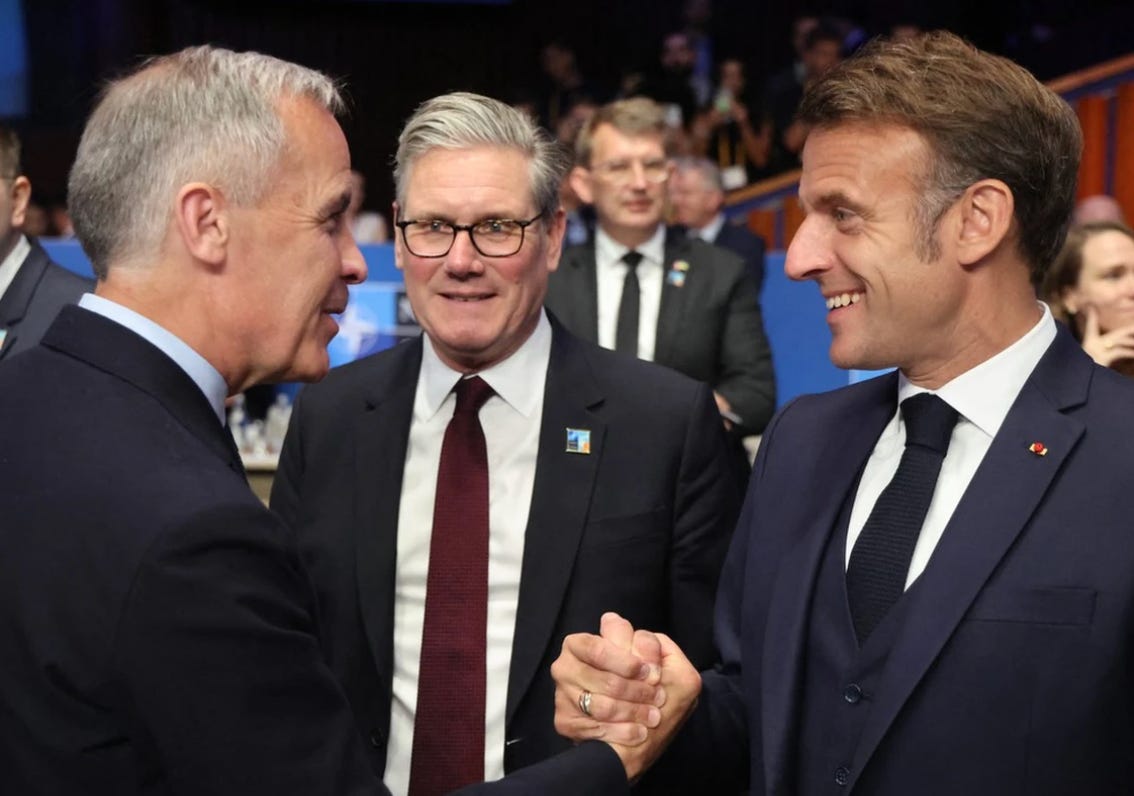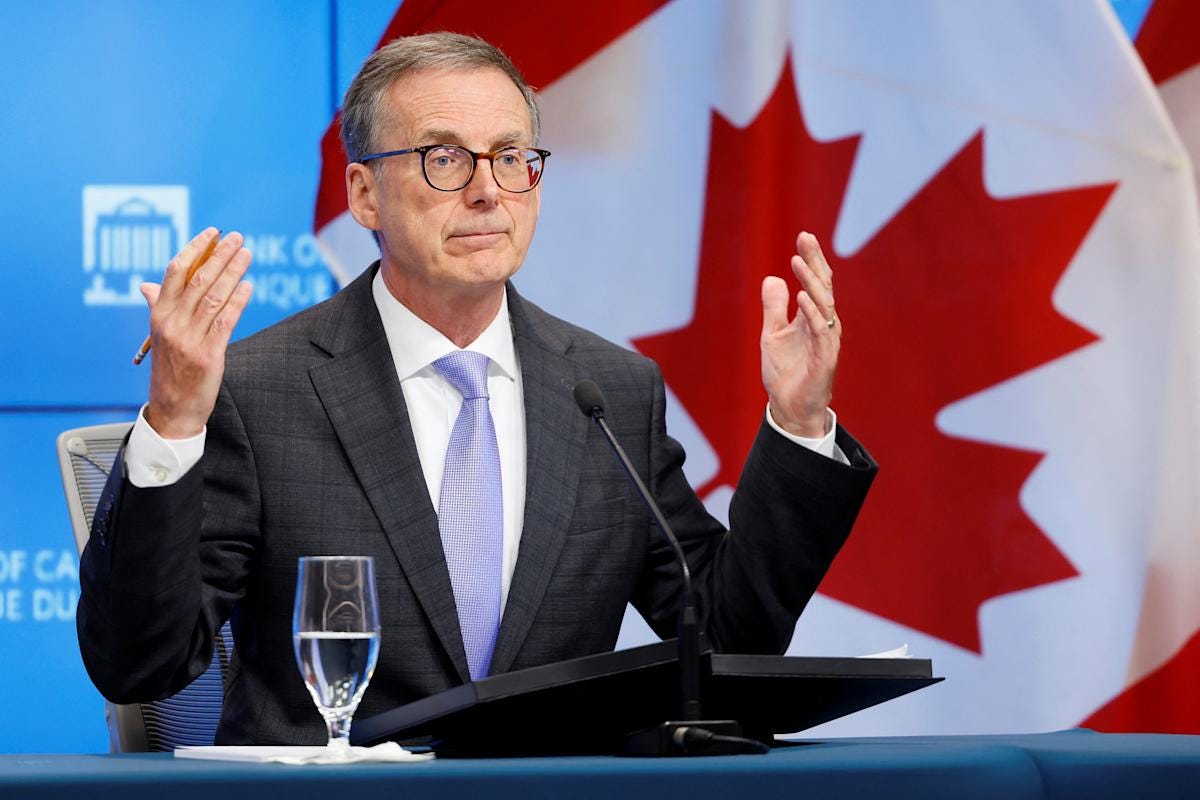Good morning, It’s Thursday, June 26th. In today’s news, Carney tells NATO that Canada will boost defence spending to 5% of GDP, Academia is helping create a global surveillance state, the CBSA is investigating immigrants linked to the Iranian regime, Trump and Israel defend the US strikes on Iran, and much more.
First time reading the Daily Blend? Sign up here.
Carney Courts Europe With Words and NATO With Billions
Prime Minister Mark Carney continues to shape his foreign policy vision with a tone that’s raising eyebrows at home. Twice in recent months—once in France and again during a NATO summit—Carney declared Canada to be “the most European of non-European countries.” Foreign Minister Mélanie Joly has repeated the same phrase, suggesting it’s no offhand comment but a coordinated message.
But what exactly does it mean?
Columnists and critics have noted that Carney offers no clear explanation. While Canada may share some values with European nations—like universal healthcare and gun control—those are common features of most developed countries outside the U.S. What seems more apparent is that Carney is positioning Canada as a transatlantic ally, rhetorically closer to Brussels and Berlin than to Washington. The subtext, many suspect, is simply: “We are not America.”
Yet Carney’s recent commitment to defence spending might tell a different story—one that aligns Canada more tightly with U.S. strategic interests. At the latest NATO summit, Carney pledged to boost military spending to a staggering 5% of GDP by 2035—well beyond Canada’s long-ignored 2% target. That would mean $150 billion annually in defence and military infrastructure, up from just $41 billion today.
The announcement follows heavy pressure from U.S. President Donald Trump, who has long criticized NATO allies for underfunding their militaries. Carney agreed to dedicate 3.5% of GDP to military spending and another 1.5% to defence-related infrastructure, such as ports, telecommunications, and critical minerals—many of which were already part of Canada’s broader industrial strategy.
How this will be funded remains unclear. Carney vaguely promised to grow the economy and balance the operating budget in three years, offering few specifics. A mid-term review is scheduled for 2029 to evaluate progress, though critics worry the pledge may outpace Canada’s procurement capabilities.
Meanwhile, Carney’s attempt to rebrand Canada as culturally and politically European rings hollow to some, especially as the government continues to embrace protectionist policies like supply management—an economic model far removed from Europe’s open internal markets.
For now, Mark Carney is trying to straddle two worlds: crafting a European identity for diplomatic appeal while ramping up defence spending to appease Washington. Whether this balancing act holds remains to be seen.
Surveillance State Powered by Academia: The Dark Side of Computer Vision Research
A recent study by researchers from Stanford University, Trinity College Dublin, and others analyzed over 19,000 academic computer vision papers and more than 23,000 patents, revealing a sharp increase—more than fivefold—from the 1990s to the 2010s in academic work contributing to surveillance-enabling patents. A focused content review of 100 research papers and 100 citing patents found that 90% of the papers and 86% of the patents involved extracting data related to humans.
What is computer vision research? It is the field of study focused on enabling computers and machines to interpret, analyze, and understand visual information from the world—like images and videos—much like humans do. It involves developing algorithms and models that allow machines to detect, recognize, and track objects, faces, gestures, and scenes for applications ranging from facial recognition and autonomous vehicles to medical imaging and surveillance.
The study highlighted how ambiguous and obfuscating language in these documents often masks the true surveillance implications by referring to humans as “objects” or using other distancing terms. This normalization of targeting human bodies and body parts is widespread in computer vision research, linking the field closely to applications in military, law enforcement, and corporate surveillance.
In an accompanying analysis, scholar Jathan Sadowski noted that this alignment is no accident but reflects the influence of powerful corporations and policing institutions shaping AI research priorities. He argued that computer vision’s focus on human data extraction is driven by these interests, with the language used effectively hiding ethical and political concerns.
The study and commentary together call for more critical inquiry and policy measures aimed at disrupting the flow of these technologies from academic labs into the military-industrial surveillance complex, warning that without such oversight, computer vision research will continue to underpin invasive surveillance systems globally.
Iran, Qatar, and the Muslim Brotherhood: Canada’s National Security Blind Spot
Two separate reports released this week reveal a growing and deeply troubling pattern: Canada is increasingly vulnerable to foreign influence and Islamist networks operating under the radar. From Iranian regime officials residing on Canadian soil to the Muslim Brotherhood embedding itself into our civil institutions, the picture is becoming clearer—Canada is failing to protect its sovereignty.
The Canada Border Services Agency (CBSA) confirmed that three senior officials from Iran’s theocratic regime have been deemed inadmissible, with deportation orders issued. Yet only one has been removed from the country. As of June, over 17,000 immigration files have been reviewed for links to the regime, with more than 100 investigations launched. While the process unfolds, Iranian dissidents and critics—like former justice minister Irwin Cotler—continue to live under threat of foreign-backed intimidation.
Meanwhile, a new report from the Institute for the Study of Global Antisemitism and Policy (ISGAP) outlines how the Muslim Brotherhood—an Islamist group tied ideologically to Hamas—has established a vast network of charities and influence operations across Canada. Organizations like the Muslim Association of Canada (MAC), which remains a registered charity, have been flagged for ties to groups like IRFAN-Canada, previously banned for funding Hamas.
The ISGAP report also highlights Qatar’s financial role in this network. The Gulf state has funded Canadian academic institutions and religious centres, including a $1.25 million donation to McGill University’s Islamic studies program and millions more toward building Islamic centres through Qatar Charity. Critics warn this foreign funding can influence Canadian institutions.
Taken together, the Iranian and Muslim Brotherhood cases illustrate a broader problem: Canadian laws and institutions are being manipulated by foreign actors—some with clear anti-Western agendas. While civil liberties must be protected, national security concerns can’t be sidelined by fear of political backlash or accusations of bias.
The CBSA, CRA, and intelligence agencies are working behind the scenes, but enforcement is slow, fragmented, and politically sensitive. As pressure mounts globally to crack down on foreign interference, Canada faces a defining choice: Will it remain a soft target for ideological exploitation, or finally draw a line in defence of its principles? Source and Source.
Trump and Israel Defend US Strikes as Huge Success Despite Agency Leak Casting Doubt
After a wave of conflicting reports, the narrative surrounding the US airstrike on Iran’s Fordow nuclear site has shifted once again. While a leaked Defence Intelligence Agency report said that the US military “missed the mark,” President Trump and Israeli officials insist the strike left Iran’s key enrichment facility “totally inoperable,” setting back its nuclear program by years. Trump blasted the leak as undermining US pilots and dismissed the intel as speculative. Iran admitted its facilities were “badly damaged,” while the UN atomic agency says it can’t verify the location of hundreds of pounds of uranium, adding further uncertainty to the fallout. More
Google Urges CRTC to Use Restraint with Online Streaming Act
Google urged the federal broadcast regulator to exercise caution in regulating online platforms, warning that applying traditional broadcasting rules to open platforms like YouTube is misguided and could harm market dynamics. The company opposes mandatory data sharing requirements, citing privacy and commercial confidentiality concerns, and argues that “undue preference” rules—originally designed for telecom and broadcast conglomerates—do not fit the online ecosystem. Despite pushback from the CRTC, Google’s stance highlights the government’s outdated approach that risks stifling innovation and censoring content by treating digital platforms like legacy media without fully understanding their unique nature. More
Statistics Canada: 6 out of 10 Canadians Concerned With Misinformation - “Those who reported being somewhat, not very, or not at all concerned about online misinformation were often more likely to have higher levels of confidence in Canadian institutions,” the report said. More
Report: Muslim Brotherhood and Qatar Have Established an Extensive Network Across Canada - The Muslim Brotherhood was founded in Egypt and seeks to establish an Islamic caliphate, and its leaders have proclaimed a 'jihad against the Jews.' More
Putin Won’t Attend BRICS Summit in Brazil Due to ICC Arrest Warrant - More
Trump Accuses Spain of Wanting NATO ‘Free Ride’ After Refusing to Meet 5% NATO Target - The US president said he would make Spain pay the contribution by imposing trade tariffs. More
Iran Arrests 700 People for Alleged Ties to Israeli Spy Network - More
Economists: Canada is in for a Rough Couple of Quarters
According to Deloitte, Canada is heading into a modest recession, with GDP expected to shrink 1.7% in Q2 and 1% in Q3. Unemployment is forecast to rise to 7.3% as job losses spread beyond manufacturing into services and transportation. Tariffs, weak investment, and stagnant consumer spending are driving the downturn. However, a rebound is expected by year-end, with 2025 growth projected at 1.1%. Upside risks include domestic tourism, "Buy Canadian" sentiment, and federal efforts to reduce trade barriers and boost investment. More
Union and DHL Reach Tentative Deal to End Two-Week Labour Dispute and Resume Operations in Canada - More
BlackBerry Returns to Profitability with a $1.9 Million Quarterly Gain - More
Scientists Found the Perfect Location on Mars Where the First Human Settlers Can Live
A new study led by planetary geologist Erica Luzzi identifies a region on Mars—Amazonis Planitia—where water ice likely lies just beneath the surface. Using high-resolution images from NASA’s Mars Reconnaissance Orbiter, researchers found signs of shallow ice ideal for supporting human missions. This mid-latitude area offers both sunlight for power and cold temperatures to preserve ice, making it a prime candidate for future landings. Accessible ice is key not only for water and fuel production but also for potential astrobiological discoveries. Robotic missions are planned to confirm the findings before human arrival. More
Scientists Find Earth’s Mantle Beating Like a Heart and Slowly Tearing Africa Apart - More
Prosecutors Drop Some Charges Against Diddy Ahead of Closing Arguments—Serious Charges Still in Play
Ahead of closing arguments in Sean "Diddy" Combs’ criminal trial, prosecutors have dropped several racketeering claims—specifically attempted kidnapping and arson tied to incidents involving Kid Cudi, as well as aiding and abetting sex trafficking. However, Combs still faces serious charges, including actual arson, kidnapping, and multiple sex trafficking offences. The move comes as the judge seeks to streamline jury instructions before deliberations begin. More
Mavericks Pick Cooper Flagg at No. 1 in 2025 NBA Draft - The 6'8" Duke star and national player of the year joins a retooling Mavericks squad following the controversial Luka Dončić trade, bringing hope to a franchise aiming for a quick return to contention. More
‘Dune’ Director Denis Villeneuve to Direct Next James Bond Film - More
NHL, NHLPA Negotiating 84-Game Season in New Collective Bargaining Agreement - More
Chinese City Sets New World Record with 11,787-Drone Light Show
A New Study Reveals That Compulsive Phone Use Triples Suicide Risk in Teens
On This Day in 1894, German engineer Karl Benz was granted a U.S. patent for his gasoline-powered automobile, helping to pave the way for the modern car.



















Disgusting.